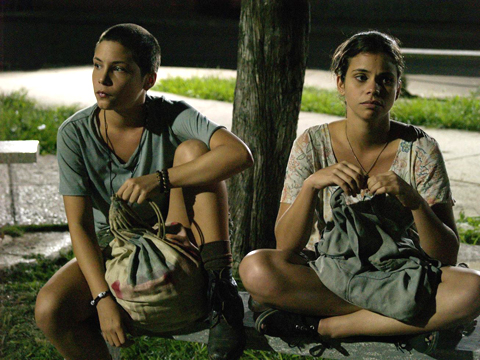Far from heaven
By Ian Craig
Boleto al paraíso (Ticket to Paradise), directed by Gerardo Chijona
(88 minutes)
Still from Boleto al paraíso, directed by Gerardo Chijona. Image courtesy the trinidad+tobago film festival
What does teenage rebellion look like in a nation whose founding myth is rebellion? Though Gerardo Chijona’s fourth feature has been billed as Cuba’s first major “AIDS film,” its exploration of this other question, through its portrait of a group of friquis (heavy rock fans), is often its most compelling aspect. While hip hop and Rastafari may have eked out a space of respect for themselves in Cuba, little attention has been paid to the wilfully unkempt devotees of thrash metal and the like, who battle the hostility of not only the police, but also peers who happen not to share their tastes. To see the familiar drama of teenage identity politics, with its tyrannies of taste and image, played out on a Cuban stage is fascinating enough, but the film also scores in sophistication by allowing us to feel solidarity for the impulses behind the friquis’ bid to be different, without asking us to sympathise, ultimately, with the means they choose to make it happen.
The film is set in 1993, in the cruelest depths of the Special Period following the collapse of the Soviet block. The demure small-town schoolgirl Eunice flees the lustful clutches of her widowed father and quickly falls in with friqui Alejandro, heading for Havana to try his luck. Like Ivan in the classic 1972 Jamaican film The Harder They Come, Alejandro has no real plan for survival, but is convinced the capital city will provide: “There’s always something in Havana.” Unlike Ivan, however, he has no aspirations to make good through any talent of his own, and we know he has funded his escape bid by robbing his hometown pharmacy. Nonetheless, the journey to Havana and Eunice’s induction into the friqui lifestyle are fuelled by a sympathetic innocence that both rings true and makes the film’s latter turn towards darkness shocking, but also just a little implausible.
Before we explore that turn, Boleto’s view of sex should be mentioned, since it is deliberately set apart from the youthful upbeats of the early going. Cuba’s reputation as a space in which sex has become a form of currency, at times apparently the most freely exchanged of all, is well known. Though some think there’s too much going on, or the right amount but for the wrong reasons, it’s often assumed that sex is somehow less fraught in Cuba than elsewhere. Set around the time when Tomás Gutiérrez Alea’s Fresa y chocolate (Strawberry and Chocolate, 1993) looked at official homophobia, Boleto explores sexual taboos that are apparently less political, but certainly no less interesting.
Eunice’s abuse by her father is suspected by no one, from the schoolteacher who clearly has her eyes on him, to her new beau Alejandro, who assumes her interruptus with him is simply because she is a shy virgin. Disturbingly, however, Alejandro has already persuaded Eunice to participate in a transactional sex act involving a panty-sniffing taxi driver; this is initially played for laughs, but it soon becomes apparent Eunice is not in on the joke. After she is separated from Alejandro — following a transgressive group sex scene in which he deliberately acquires HIV — she hooks up with Yusma, a rare Afro-Cuban habitué of the friqui scene. To earn her keep, Eunice has to follow Yusma onto the street stuffed into a clingy mini-dress to turn tricks. The fade to solemnity of Yusma’s radiant smile as the passing cars leave her behind tells the story of the Cuba of the era: barely getting by on natural charm and native wit, but frankly tired of having to do so.
In the third act, Alejandro bitterly realises he has bought himself a ticket to a very dubious paradise indeed in the form of the Los Cocos AIDS hospice. Though this plotline is based on real events recounted in hospice director Jorge Pérez’s AIDS: Confessions to a Doctor, and subsequently researched by Chijona, who met the people involved, it still feels like there’s something missing in the middle of the film to explain Alejandro’s momentous decision to get himself infected. This may be because the characters’ dire straits are sometimes referenced in Cuban cinematic shorthand: though it’s perhaps shocking to see someone dumpster-diving in a co-production of the ICAIC, the official Cuban film institute, police harassment looks relatively mild compared to any US crime drama. Nonetheless, this is a small dramatic misstep in a story given bite by an ensemble of young actors who offer uniformly strong performances — particularly Miriel Cejas as Eunice, whose expressive features bookend the film in close-up. The film is ultimately her story, and though the freedom she achieves may be grimly conditional, she manages to make it feel like a triumph nonetheless.
•••
This review is part of a special section on recent Caribbean film, supported by the trinidad+tobago film festival 2011
•
The Caribbean Review of Books, September 2011
Ian Craig is senior lecturer in Spanish at the University of the West Indies, Cave Hill. Born and educated in England, he lived in Spain before moving to Barbados, where he teaches Latin American Film. In 2007 he co-ordinated a documentary workshop at the International School of Film and Television in Cuba, and he now co-curates the Africa World Documentary Film Festival at Cave Hill.





